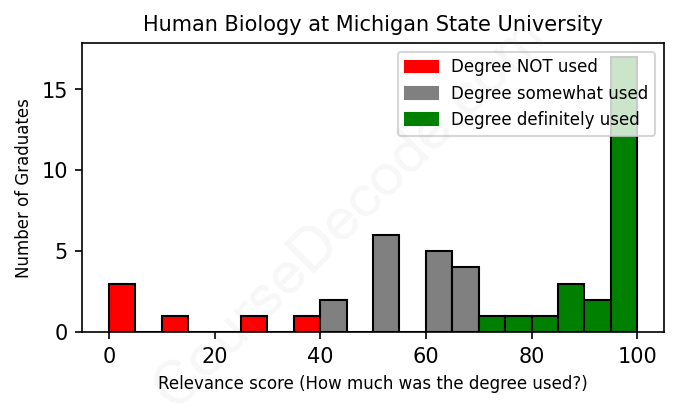
First, some facts. Of the Human Biology graduates from Michigan State University we've analyzed , here's how many have used (or NOT used) their degree in their career:

These are estimates based on AI analysis of 48 LinkedIn profiles (see below).
The verdict? Slightly above average. Overall, with an average relevance score of 71%, Human Biology graduates from Michigan State University have a slightly higher likelihood (+4%) of finding work in this field compared to the average graduate across all fields:
And for comparison, here's the chart for all profiles we've looked at across all degrees.
Also, after graduating, 60% of these graduates have pursued further education other than another Bachelor's degree (such as a Masters degree or other), compared to the average across all profiles of 35%. This suggests you may need more than just a Bachelors degree to be competitive as a Human Biology graduate.
See the details:
|
Relevance score: 0% We think this person has NOT gone into a career related to their degree. We think this person has NOT gone into a career related to their degree.
DEGREE INFOGraduated in 2011 from Michigan State University with a Bachelors Degree in Human Biology. No other secondary education since. JOB HISTORY SINCE GRADUATIONOperations Manager Sports Authority Feb 2013 - Nov 2015 1st Assistant Golf Professional  Pope Golf / Pope Properties Nov 2015 - Oct 2018 1st Assistant Golf Professional  THE CLUB AT THE STRAND Oct 2018 - Feb 2020 Head Golf Professional  Pope Golf / Pope Properties Feb 2020 - Mar 2021 Inventory Manager  Marissa Collections Apr 2021 - Jun 2022 1st Assistant Golf Professional  Collier's Reserve Country Club Jun 2022 - Nov 2022 Head Golf Professional  Invited Oct 2022 - Present ABOUTNo information provided. |
The top 10 most common jobs done by the graduates we've analyzed (ranked most common to least) are:
Based on the broad range of job titles and sectors represented in the profiles of LinkedIn alumni from Michigan State University with a degree in Human Biology, it’s clear that there’s a diverse array of career paths. Some graduates found their niche in healthcare settings, taking on roles like Medical Assistants, Physician Assistants, and Clinical Technicians, which directly involve applying the principles of human biology to their daily tasks. Others ventured into research-oriented positions as Research Assistants or Technicians in medical settings or even in environmental sciences, utilizing their biological knowledge in practical applications. There’s also a noteworthy number of graduates who have taken on roles outside of traditional biology-related fields, such as Sales and Management positions, which, while they may tangentially relate to health or human biology concepts, don’t directly apply scientific knowledge on a daily basis.
Overall, while many graduates have successfully integrated their Human Biology education into relevant and career-advancing positions in healthcare and research, a significant portion have also taken roles that are less tied to their degree. This creates a mixed picture: while healthcare-related jobs show a strong connection and relevance to human biology, other fields like law, finance, and retail are less linked, illustrating that a degree in Human Biology offers flexibility but doesn’t guarantee employment in the field itself. It’s a reminder that while your degree is important, your interests, skills, and the job market also play pivotal roles in shaping your career journey.
Here is a visual representation of the most common words in job titles for Human Biology graduates (this is across all Human Biology graduates we've analyzed, not just those who went to Michigan State University):

Graduates from Michigan State University with a degree in Human Biology seem to have quite a varied career trajectory. Starting out, many of them landed their first jobs in practical or healthcare-related fields. For example, we see early-career roles such as Medical Assistant, Emergency Room Technician, and Research Assistant, indicating that a fair number of these graduates pivot into hands-on positions that align closely with their studies. Others ventured into sales and management positions in health-related sectors, suggesting that their degrees also equipped them with a solid foundation for business roles within scientific industries.
Looking at more experienced graduates, about five to ten years down the line, there’s a noticeable trend toward advanced medical and scientific roles. Many are working as Physician Assistants, Pharmaceutics, and Microbiologists, and some have even progressed to higher positions in healthcare or started their own businesses. However, not all paths have remained directly related to Human Biology; some graduates have wandered into quite different fields, including roles in education, sports management, and even marketing. This mixture reflects a blend of solid foundational careers in healthcare and instances of career pivoting, so while many are enjoying successful and relevant careers in the medical field, a notable number have veered off into unrelated areas. Overall, graduates seem to be finding their niche, but the journey is diverse and individualistic.
Honestly, a Bachelor degree in Human Biology can be quite challenging, but it's not impossible if you stay organized and motivated! At Michigan State University, you’ll dive into a mix of biology, anatomy, and physiology, and you’ll likely encounter some tough coursework, especially in the science-heavy classes. You might find yourself juggling lab work, exams, and projects, which can be stressful at times. That said, if you have a strong interest in the subject and put in the effort, it can also be incredibly rewarding. Just be prepared for those long nights and coffee-fueled study sessions, and you’ll be just fine!
Most commonly, in the LinkedIn profiles we've looked at, it takes people 4 years to finish a Bachelor degree in Human Biology.
Looking at the job histories of these Michigan State University Human Biology graduates, it seems like there’s a pretty mixed bag when it comes to how well they’re doing financially. Some of the folks who went into law, medicine, and high-level sales positions probably raked in decent salaries, especially as they moved up the ladder—like the attorneys and doctors, who can make a good chunk of change once they're established. On the flip side, others in roles like research assistants or sales associates seem to be earning more modest incomes, especially in the early stages of their careers. Overall, it looks like some of these grads are making good money, while others are still figuring things out, so it really depends on the career path they took after college!
Here is a visual representation of the most common words seen in the "about" section of LinkedIn profiles who have a Bachelor degree in Human Biology (this is across all Human Biology graduates we've analyzed, not just those who went to Michigan State University). This may or may not be useful:

Here are all colleges offering a Bachelor degree in Human Biology (ordered by the average relevance score of their Human Biology graduates, best to worst) where we have analyzed at least 10 of their graduates:
| College | Score | Count |
|---|---|---|
 Indiana University Bloomington Indiana University Bloomington
|
95 | 10 |
 University of California San Diego University of California San Diego
|
89 | 20 |
 UC San Diego UC San Diego
|
89 | 18 |
 University of California, San Diego University of California, San Diego
|
86 | 16 |
 Stanford University Stanford University
|
84 | 10 |
 University of California, Merced University of California, Merced
|
84 | 16 |
 University of Wisconsin-Green Bay University of Wisconsin-Green Bay
|
79 | 10 |
 North Carolina State University North Carolina State University
|
75 | 31 |
 Michigan State University Michigan State University
|
71 | 48 |
 The University of Texas at Austin The University of Texas at Austin
|
69 | 17 |
 University at Albany, SUNY University at Albany, SUNY
|
69 | 15 |
 Hunter College Hunter College
|
60 | 14 |
 University of Southern California University of Southern California
|
58 | 16 |